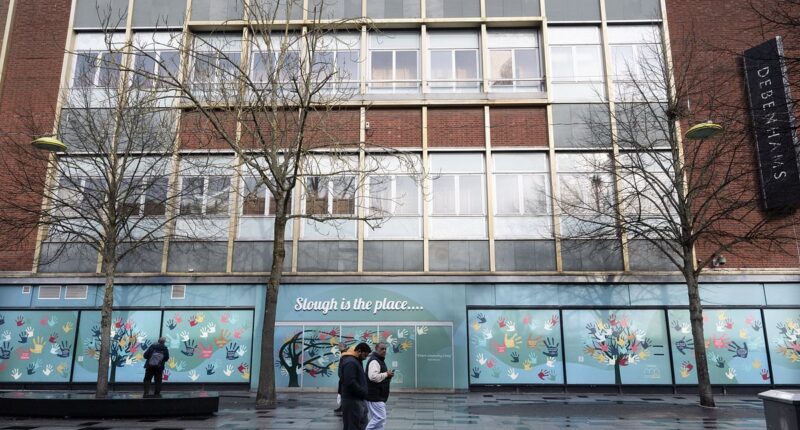Arriving on Slough High Street on a grey weekday morning, I have barely had time to take out my notebook when I am accosted by an angry-looking man on crutches.
‘Oi, mate,’ he bellows. ‘You writing about Slough? Tell ’em it’s a complete s*** hole.’
It’s not quite the welcome I’d hoped for on returning to the town where I was born and lived until the age of five.
But this is a foretaste of the shocking things I will see and hear during my visit to what another local described to me as ‘the armpit of Berkshire’.
He’s not alone in that view. Ricky Gervais settled on it as the ultimate dreary location for his hit TV comedy The Office, but there’s nothing amusing about life in the real-life Slough. Indeed, it is Britain’s most miserable town according to a recent poll by property website Rightmove, which asked people to rate the places where they lived.
That damning verdict came soon after one national newspaper described Slough Britain’s ‘ugliest’ town.
And nowhere is that ugliness more apparent than here on the High Street – which once bustled with such a wealth of different shops that it was dubbed The Golden Mile.
Now, 20 per cent of units here are vacant according to the latest figures from consultancy JDM Retail. And while the sight of whitewashed windows is all too familiar in high streets across the country, there’s something peculiarly bleak about the shops that do remain open here – a soulless stretch of pawnbrokers, bookies, pound shops and grubby outlets hawking mobile phones, vapes and fried chicken.

Tale of two towns: Slough’s thriving High Street in the early 1970s…

… and how it looks now. It’s the place to do drugs, judging by the stench of cannabis wafting past at regular intervals
In a desperate effort to enliven this pedestrianised strip of despair, the local Business Improvement District organisation has decorated the hoardings outside what used to be Marks & Spencer with supposedly inspirational messages proclaiming that ‘Slough is the place’.
The place for what exactly? The place to do drugs, judging by the stench of cannabis wafting past me at regular intervals.
Also the place to do unthinkable things in public, according to 67-year-old John Hughes who’s run his baked potato stall in the High Street for the last 34 years. ‘You get lots of down and outs here,’ he says. ‘The other day I saw a man defecating just around the corner. And my friend who runs another stall saw a couple having sex in the road just along from Boots – and this was in broad daylight. There are toilets in the shopping centre but people wee up the doors outside all the time. It’s like they just can’t be bothered to go in and nobody does anything about it.’
Having seen the stomach-churning state of the toilets he’s talking about, it’s not surprising people don’t want to use them. I push one cubicle door open to find the seat covered in excrement.
I did not expect things to be this bad. Slough has never claimed to be beautiful or twee but it was always proud – shrugging off the criticisms of those such as the late Poet Laureate Sir John Betjeman who famously invited ‘friendly bombs’ to ‘fall on Slough’.
What Betjeman was railing against in 1937 was the modernity of one of Britain’s most successful light industrial towns, to which people moved from all over the country to work. He reviled the ‘labour-saving homes’ and ‘air-conditioned, bright canteens’, and lamented that the town’s young workers ‘do not know/the birdsong from the radio’.
The biggest money-maker was the Slough Trading Estate where my parents Pat and Maureen both worked for the confectionery giant Mars – Mum in the typing pool and Dad polishing Maltesers (yes, that really was a job).
A town built for factory workers, Slough is still full of some of the most uninspiring housing estates imaginable. But, as they set out on married life, my parents were thrilled to get a council flat on the seventh floor of a tower block next to the newly-built M4 and, although money was tight, a visit to Slough High Street was always something to look forward to.

I find a few shoppers wandering the largely deserted High Street with memories of the days when it was full of stalwarts including Littlewoods, British Home Stores, Debenhams and Marks & Spencer, writes David Leafe (pictured)
A treasured photo from my 60s childhood shows me and my little sister Jeanette (we were then five and three), perched on Father Christmas’s knees in the grotto in Suters – Slough’s best-known department store.
We’re dressed up for the occasion because visiting Suters was a big deal then. With its smartly uniformed sales staff and lift attendants, this glittering emporium had everything you could need – from the tights sold by my Auntie Eve, who got a job on the hosiery counter straight out of school, to my gleaming Pedigree pram, bought for 19 guineas, nearly two week’s wages for Dad.
As in other towns and cities across the country, much of the trade once enjoyed by high street retailers such as Suters has been snatched away by online shopping, retail parks and superstores – such as the monstrous 100,000 sq ft Tesco Extra plonked between the Grade-II listed railway station, one of Slough’s very few attractive buildings, and the High Street.
Despite the supermarket’s hulking presence, I find a few shoppers wandering the largely deserted High Street with memories of the days when it was full of stalwarts including Littlewoods, British Home Stores, Debenhams and Marks & Spencer.
‘It’s heartbreaking to see the High Street like this because when you came here on a Saturday afternoon years ago it was so busy that you could hardly move,’ remembers 78-year-old Ken Fletcher, a retired quarryman. ‘Now it’s really grim. We’d rather drive to places like Bracknell. That’s a good shopping centre.’
Ken and his wife Katie, also 78, are only here today to buy a birthday card and get a few things from Iceland, which occupies a site once so prized that Waitrose chose to open one of their first supermarkets there in 1963.

A treasured photo from David’s 60s childhood shows him and his little sister Jeanette perched on Father Christmas’s knees in the grotto in Suters – Slough’s best-known department store
Further up the High Street, I meet 86-year-old Pat Phillips who once worked in personnel at Mars.
‘I don’t live far so I’ve walked here for a loaf of bread,’ she says. ‘But that’s about it.
‘I remember when there was a furniture store here called Isaacs where my mother bought a beautiful sideboard which I still have today. Next to that was a dress shop where I bought this wonderful pale blue ballgown which I wore to someone’s engagement party. You couldn’t get anything like that in Slough now. It’s dead really.’
How far away those days seem as I stand outside what was once Suters and stare at the garish slot machine arcade opposite, where Lidstones, the family bakery, once stood.
Nearby, two young lads are engaged in what looks suspiciously like a drug deal while a woman feeds the pigeons whose droppings have long encrusted the nearby benches, making it impossible to sit down.
This unedifying scene takes place outside the boarded-up Queensmere Shopping Centre, offices within which have been loaned to a charity tackling homelessness – a huge problem in Slough despite the money still pouring into the town.
The trading estate, which remains the largest in Europe, is a major international centre for the ‘cloud’ servers where the vast amounts of data on our phones and computers are stored remotely. It’s also home to many big companies including Mars, Lego, O2, Ferrari, GlaxoSmithKline and Maserati – and property prices here are rising fast with the average cost of a home increasing by 15 per cent during 2024.
Slough has become still more attractive to businesses following the opening in 2022 of the Elizabeth Line but that fast link into London has also sparked a rise in rents which has added to the homelessness problem here.

Baked potato seller John Hughes has suffered a 50 per cent drop in trade over the last year
Figures released by the charity Shelter in December revealed that Slough has the highest rate of any borough outside of London – with one in 51 people sleeping rough or in temporary accommodation.
One in five children here live in poverty while another problem for the town is anti-social behaviour, as experienced by 44-year-old Ramia Muhjazi, a mother-of-three whose florist Flower Tale remains one of the few independents of note on the High Street.
Ramia opened her store seven years ago and since then she has had to call the police more than 20 times because of shoplifters and threats of physical attack.
On one occasion, a drunk brandishing a broken bottle lurched into her shop. She only escaped serious injury by running to the off-licence next door and hiding behind the counter.
There were 1,196 recorded instances of shoplifting in Slough in 2024 – a staggering 51 per cent increase on the previous year – and even that does not reflect the true total, with retailers like Ramia long giving up on calling the police. ‘I’ve got fed up of them doing nothing about it,’ she says.
On occasions, she has even tackled the thieves themselves – once chasing a shoplifter up the street.
‘I caught him and made him give back all the perfumes he’d stolen,’ she says. ‘I felt like a superhero but, although I joke about it now, it was seriously scary for me.’
Since Ramia was able to take orders over the phone, she managed to trade throughout the pandemic but now the real challenge is the cost of living crisis. ‘I used to get customers ringing up and asking for bouquets around £100,’ she says. ‘Now it’s only £40.’
Down at the other end of the High Street, baked potato seller John Hughes has suffered a 50 per cent drop in trade over the last year. ‘We’re still earning a good living because we know the locals but I wouldn’t fancy starting up a business here now,’ he sighs.
For Ramia, surviving means opening seven days a week and doing most of the work herself.
The increase in employers’ national insurance contributions announced in the October Budget and the forthcoming increase in minimum wage this April make it even less likely she will be able to take on new staff.
As for the future, the council has still to rebuild the town’s main bus station, destroyed in a suspected arson attack in 2022.
Anyone trying to get home from the High Street must now wait at outdoor bus shelters – an uninviting prospect in bad weather and another challenge for retailers desperate to attract custom.
It doesn’t help that Slough’s then Labour-run council was declared bankrupt in 2021, after what an independent review described as ‘several years of mismanagement’ led to it running up £760million in debt.

‘It’s really grim,’ says retired quarryman Ken Fletcher, 78, out shopping with wife Katie
Currently run by the Conservatives, the council hopes to become self-sufficient within the next two years. But they have little power to redevelop the High Street because much of it belongs to the Abu Dhabi Investment Authority (ADIA) which bought the Queensmere and Observatory Shopping Centres in 2016 and has not followed through on plans to replace them with new businesses, shops and homes.
Now the ADIA is believed to be selling the sites on and who knows when, or if, the new owners will finally do something to help this most beleaguered of high
streets.After a long and dispiriting day here, the only positive note is struck by 55-year-old singer Cyrus Stone who travels the 25 miles from St Albans to busk on the High Street, offering bright red tambourines to anyone who wants to accompany him.
‘I really like the people in Slough,’ he says. ‘The place is depressing but the people here wave and sing along with me, especially the kids.’
As I start walking back to the railway station Cyrus bursts into a rendition of the gospel song Oh Happy Day – a refreshing blast of optimism in a town which does retain a few familiar names including Boots, JD Sports, Foot Locker and Specsavers.
The problem is that they stick out like the few remaining teeth in a mouth black with decay and you have to wonder how long it will be before they too drop out of what John Betjeman so accurately described as ‘this mess they call a town’.
















